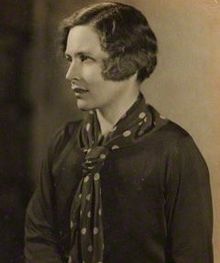
This month’s Kickass Women is brought to you by Hilda Matheson, a woman who essentially invented talk radio. Hilda was a charismatic British woman who is best known for her work with the then-brand new British Broadcasting Company (BBC). As the Director of Talks, she developed the BBC’s first news section and increased radio’s style and prestige.
Matheson was born in 1888. Like many women, Matheson’s employment prospects rose with the start of WWI. She worked for MI5 and then as Lady Nancy Astor’s political secretary.
Meanwhile radio was becoming the entertainment medium that would grow to dominate  the entertainment world until the rise of television. The BBC was founded in 1922 and relied on women for clerical work as well as production.
the entertainment world until the rise of television. The BBC was founded in 1922 and relied on women for clerical work as well as production.
According to BBC News Magazine:
In 1926, John Reith, the BBC’s managing director, issued a statement declaring that women should be “on the same footing as men”, with the same chances for promotion. Women were on the same salary scales as men, and there was no Marriage Bar, at least not until 1932. Even then, the BBC made allowances for exceptional women to remain on the staff list.
John Reith, the managing director, convinced Matheson to come to work for the BBC in 1926 and they commenced to fight for the next seven years (he was conservative and she was liberal). Initially the BBC didn’t produce its own news. Matheson established the first news program, and also raised the status of radio by convincing well-known intellectuals to talk on the air. She also experimented with the style of broadcasts and established a more casual and personal format as opposed to lectures. From The Guardian:
She, like her colleagues, was making up broadcasting as she went along. What was a “programme”? The models for BBC broadcasts were the public lecture, the political speech, the theatre and the variety hall. One of Matheson’s many achievements was to realize that the microphone demanded an entirely different manner from the podium. “It was useless to address the microphone as if it were a public meeting, or even to read it essays or leading articles,” she wrote. “The person sitting at the other end expected the speaker to address him personally, simply, almost familiarly.” She rehearsed, coaxed and harried speakers until they found a mode of speech that worked.
Matheson created and supported programming that helped British women, who got the vote in 1928, become familiar with the political issues of the day. She pushed for programming that left listener both enlightened and entertained. Matheson left the BBC when Reith refused to allow Harold Nicholson to discuss Lady Chatterley’s Lover and Ulysses on a BBC program.
Matheson was a lesbian. She had a two-year relationship with the writer Vita Sackville-West during the same time that Sackville-West was also in a relationship with Virginia Woolf (not surprisingly, Woolf couldn’t stand Matheson). Matheson was in a relationship with Dorothy Violet Wellesley for eight years. The couple lived and travelled together for many years until Matheson’s death. Trivia alert – Wellesley had previously been in an intense relationship with Sackville-West and left her husband and children for her. So Matheson and Wellesley shared an ex-girlfriend.
After leaving the BBC, Matheson wrote On Broadcasting and was awarded the Officer of the Most Excellent Order of the British Empire (OBE) for her work in coordinating The African Survey. During WWII, she worked in radio and in publishing to counter German propaganda with positive stories and images about Britain. Matheson died of Graves Disease in 1940.
Sources for more information:
“What Can the Origins of the BBC Tell Us About Its Future,” by Charlotte Higgins for The Guardian
“Viewpoint: the Pioneering Women of the BBC’s Early Years,” by Kate Murphy for BBC News Magazine
“Queer Women History Forgot: Hilda Matheson,” by Corinne Werder for Go Magazine


Vita Sackville-West seemed to have a flair for getting women to leave their husbands and children to be with her—although she never left her own husband or children…for long. Violet Trefusis had a long relationship with her—leaving her husband (they had no children) and “eloping” to the continent. Things ended in recriminations on both sides. Depending on what you read, VS-W was either a manipulative narcissist or an easily-deluded romantic. Possibly a little of each.
If you want to read a pretty interesting (fiction) book with Hilda as a character – I highly recommend “Radio Girls.” Great read if you’re looking to learn more, in a light hearted and entertaining sort of way, about radio in the 1930s.
Hilda Matheson was certainly an accomplished woman. She really did a great deal for early radio. What really stands out for me is John Reith, the BBC’s managing director, declaring that women should be “on the same footing as men”, Very enlightened for that time. Unfortunately it seems that Matheon’s being a lesbian didn’t get the same enlightened look.
Anyway, I always enjoy ‘Kick Ass Women of History’. A great feature!
Dennis